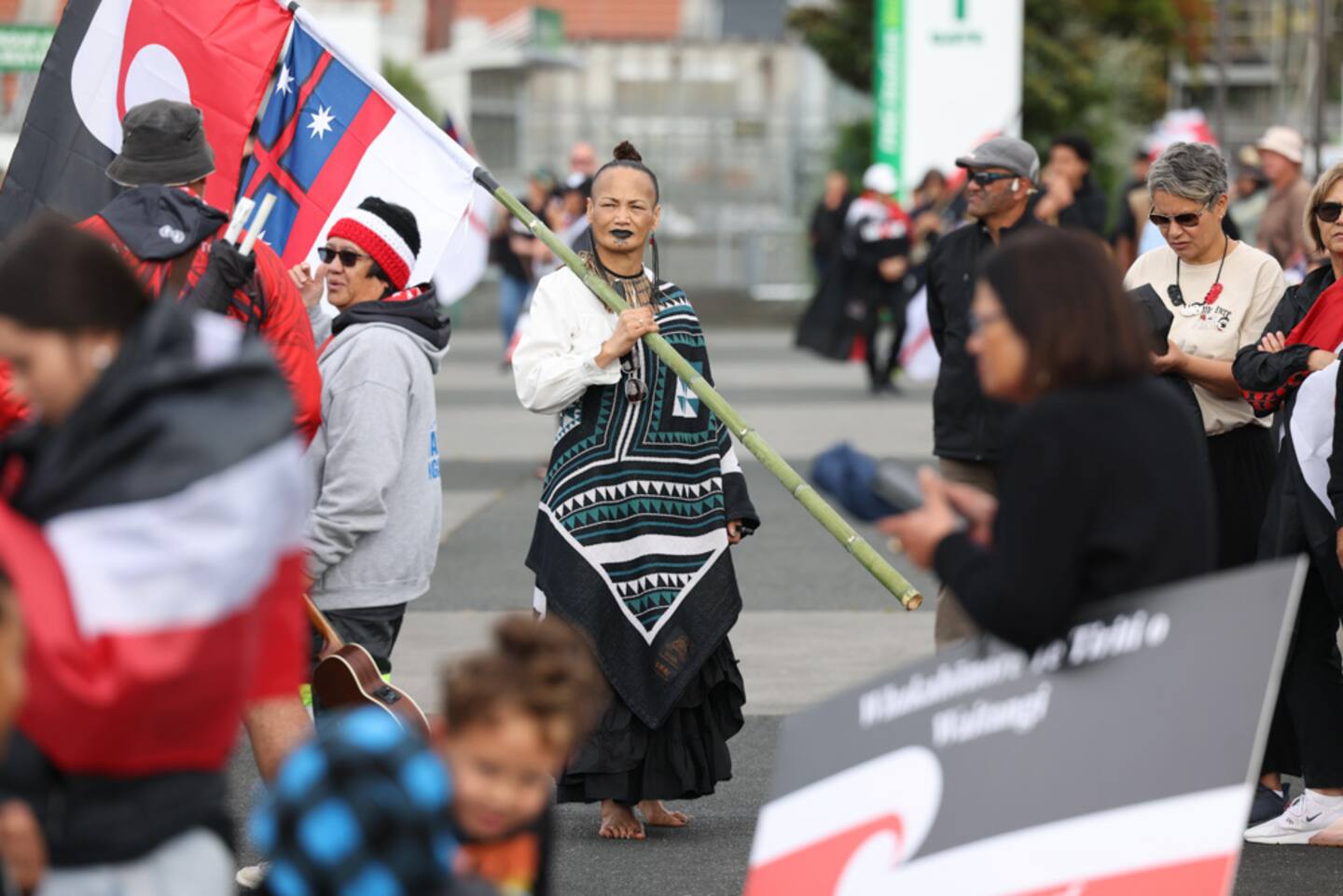Prime Minister Christopher Luxon has criticised the controversial Treaty Principles Bill ahead of its first reading today, calling the draft legislation “very simplistic”.
Parliament is preparing for protests both inside and out as the bill, put up by Act leader David Seymour, gets its first reading this afternoon.
Speaker Gerry Brownlee is expected to warn members of the public that if there are any attempts to disrupt proceedings, he will clear the public galleries.
Luxon won’t be in Parliament this afternoon as he’s leaving New Zealand to attend the APEC summit in Peru. He has been criticised for being away while the bill is debated.
Luxon held a press conference this morning, telling reporters APEC had been locked in his calendar for some time and was a very important event for a trading nation like New Zealand.
He said National continues to oppose the bill in principle and will support the legislation at today’s first reading, but no further.
Luxon said National MPs will vote as a party. The Greens had requested a conscience vote on the issue, meaning individual MPs could vote as they please.
He said no National MPs had requested a conscience vote and there had been “good discussions” among MPs about the bill.
Luxon said National wants to engage on issues “case by case” and said this “very simplistic” bill negates more than 184 years of debate and discussion. He said the Treaty Principles Bill was not helping get New Zealand back on track.
 Prime Minister Christopher Luxon speaks to media ahead of the Treaty Principles Bill first reading. Photo / Mark Mitchell
Prime Minister Christopher Luxon speaks to media ahead of the Treaty Principles Bill first reading. Photo / Mark Mitchell
Asked about the KC opposition to the bill, Luxon said the Select Committee process allows members of the public to have their view heard.
Asked about comments from Chris Hipkins that Luxon is putting his deal with Act’s David Seymour over his election commitment not to support the bill, Luxon said it is an outcome of the MMP environment where a compromise has to be found between parties. He said that was necessary as the parties formed a government.
He said it was a reality of the political system. There is a “massive amount of alignment” between governing parties on other issues like the economy and law and order, Luxon said.
He said the Government has been working in good faith with the Waitangi Tribunal and believes that will continue going forward.
It is understood the Speaker has told political parties that he intends to rule if there is any disruption at all – such as shouting – from members of the public that he will clear the entire public gallery out.
Brownlee would not comment on his plans for the debate, saying only that he intended to speak to the House at the start of the debate on the bill.
“I will be talking to the House at the start of the Bill, but I’m not making any comments before that.”
Staff at Parliament were emailed this morning and advised protests were expected today and police would be on hand to help Parliamentary Security if there were any issues.
It comes as thousands march towards Wellington in opposition, while critics inside Parliament accuse the Government of “divisive politics” and betraying voters’ trust.
Increased security measures will also be in place at Parliament next week – and public tours will be cancelled on Monday and Tuesday.
The email said the hīkoi was expected to be peaceful and organisers had been working with the Speaker’s office to ensure it did not breach the rules for protests on Parliament grounds.
 A national hīkoi protesting the bill is making its way south to Wellington, reaching Hamilton today. Photo / Mike Scott
A national hīkoi protesting the bill is making its way south to Wellington, reaching Hamilton today. Photo / Mike Scott
The bill is part of Act’s coalition agreement under which National and NZ First will support it at its first reading, sending it a select committee for six months and public submissions. Both parties have said they will not support at its second reading - meaning it will not come into law.
Act Party leader David Seymour, the architect of the legislation, denies the bill is divisive and doesn’t believe those protesting it have actually read it. He said it doesn’t do anything controversial, but instead affirms New Zealanders’ equal rights.
Luxon still isn’t keen, but he’s promising National will uphold its coalition commitment to back the legislation at its first reading. That’s as far as the party’s support will go, however, he says.
A crowd of a more than 5000 crossed the Auckland Harbour Bridge on Wednesday morning as the Hīkoi mō te Tiriti (March for the Treaty of Waitangi) continues its march south to the capital. It caused significant traffic delays on the critical connection.
Politicians from Labour, the Greens and Te Pāti Māori joined them, including Te Pāti Māori co-leader Rawiri Waititi, who said he was proud of the unity on display in the hīkoi and expected the numbers to grow before it hit Wellington next week.
“By the time we get to Wellington, this would have quadrupled in size and in mass, because people are really concerned about how the country has been divided through legislation like the Treaty Principles Bill,” he said.
That bill seeks to define the principles of the Treaty so their meaning in legislation can be clearly interpreted. Currently, principles mentioned across legislation are not defined by Parliament but have instead been mostly derived from court rulings and Government statements.
Seymour believes the bill would provide certainty and promote a national conversation about the principles’ place in the country’s constitutional arrangements.
The principles in the draft legislation – officially the “Principles of the Treaty of Waitangi Bill” – include that the Government has the power to govern in the interests of everyone and everyone is equal before the law.
The second principle has gone through some wording changes. The legislation says the Crown recognises, and will respect and protect, the rights that hapū and iwi Māori had under the Treaty of Waitangi and Te Tiriti at the time they signed it.
However, if those rights differ “from the rights from everyone”, that principle will only apply “if those rights are agreed in the settlement of a historical treaty claim under the Treaty of Waitangi Act 1975”.
The bill says it doesn’t amend the text of the actual Treaty and can’t be used to interpret Treaty settlement legislation.
 Act leader David Seymour. Photo / Ben Dickens
Act leader David Seymour. Photo / Ben Dickens
Seymour said critics of his legislation should read it.
“Once you see it, ask yourself what’s wrong with the Government having the right to govern, the Government having an obligation to uphold all people’s rights and all people’s rights being equal before the law?”
He said it doesn’t “take away” the Māori language or culture or “undermine Treaty settlements”, as he said some had claimed.
Late on Wednesday, a collective of King’s Counsel outlined their concerns about the bill, including that the proposed principles didn’t adequately reflect the articles of the Treaty and that it would cause significant legal confusion and uncertainty.
They noted that the existing principles have been developed by the courts over the past 50 years and now represented settled law.
Seymour has previously said if Parliament doesn’t define the principles, “the courts will continue to meddle in this area of critical political and constitutional importance”.
The lawyers also said that while a select committee process allowed for public engagement, there should have been specific engagement with Māori prior.
“In addition to the obvious risk of a poor legislative outcome, this has created mistrust and calls into question whether the stated objective of an open, informed public debate is genuine.”
The Waitangi Tribunal last week said the bill would be “the worst, most comprehensive breach of the Treaty/Te Tiriti in modern times”. It also argued there had been a lack of consultation with Māori.
“At present, the progressing of the bill is having serious impacts on the relationship,” the tribunal said. “But the bill, if enacted, would kill that relationship.”
 Prime Minister Christopher Luxon. Photo / Mark Mitchell
Prime Minister Christopher Luxon. Photo / Mark Mitchell
Luxon has said he believes it is divisive and there is nothing in it that he likes.
He reiterated on Wednesday that National would support it only at first reading, in line with the National-Act coalition agreement.
“We honour our coalition agreements in an MMP environment. We will support the bill at the first reading. We don’t support it beyond that and will vote it down.”
Seymour believes, over time, National may come around to the legislation.
“I think that they are perhaps less keen on taking on a tough issue. That has always been true. Act is a party that will take on hard issues and often, like Three Strikes, like charter schools, give it a few years and the National Party says, ‘best thing we ever thought of’.
“We are quite happy because we know there is no limit to what you can achieve if you don’t care who takes the credit.”
Labour leader Chris Hipkins said the hīkoi showed people unified in not wanting “divisive politics”. He said it wasn’t too late for the Prime Minister to pull his support.
“The National Party can honour the commitment that it made to New Zealanders before the election and vote against this bill.
“They never should have agreed to it in the coalition agreement. They said before the election that they wouldn’t support it. I I think they’ve betrayed voters’ trust in signing up to it as part of the coalition agreement.”
Seymour faced a barracking during Question Time as he spoke about the bill.
While reading out some feedback he had received about it, which was also critical of Te Pāti Māori, Te Pāti Māori co-leader Debbie Ngarewa-Packer said Seymour was “desperate” and “clutching at straws”.
A large chunk of Question Time involved questions about the bill, from an assortment of different angles, leading Justice Minister Paul Goldsmith to later remark: “Clearly, the other side have woken up this morning and decided to have every question on this particular area today in the House, and so they’re straining to draw different bills into different ministerial responsibilities.”
Jamie Ensor is a political reporter in the NZ Herald press gallery team based at Parliament. He was previously a TV reporter and digital producer in the Newshub press gallery office.
Take your Radio, Podcasts and Music with you









